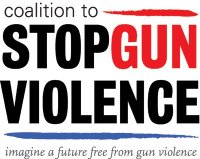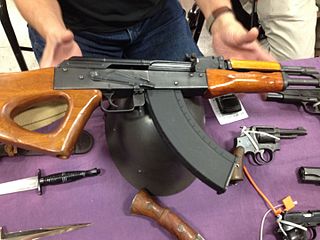
The Brady Handgun Violence Prevention Act, often referred to as the Brady Act, the Brady Bill or the Brady Handgun Bill, is an Act of the United States Congress that mandated federal background checks on firearm purchasers in the United States. It also imposed a five-day waiting period on purchases until the National Instant Criminal Background Check System (NICS) was implemented in 1998. Introduced by U.S. representative Chuck Schumer of New York, the Brady Act was a landmark legislative enactment during the Clinton administration. The act was appended to the end of Section 922 of title 18, United States Code. The intention of the act was to prevent persons with previous serious convictions from purchasing firearms.

The Gun Control Act of 1968 is a U.S. federal law that regulates the firearms industry and firearms ownership. Due to constitutional limitations, the Act is primarily based on regulating interstate commerce in firearms by generally prohibiting interstate firearms transfers except by manufacturers, dealers and importers licensed under a scheme set up under the Act.

The Coalition to Stop Gun Violence (CSGV) and the Educational Fund to Stop Gun Violence, its sister organization, were two parts of a national, non-profit gun control advocacy organization opposed to gun violence. Since 1974, it supported reduction in American gun violence via education and legislation. They ceased operations in 2022 after the EFSGV merged with the Johns Hopkins Center for Gun Violence Prevention and Policy to become the Johns Hopkins Center for Gun Violence Solutions.

Brady: United Against Gun Violence is an American nonprofit organization that advocates for gun control and against gun violence. It is named after former White House press secretary James "Jim" Brady, who was permanently disabled and later died in 2014 as a result of the Ronald Reagan assassination attempt of 1981, and his wife Sarah Brady, who was a chairwoman of the organization from 1989 until her death in 2015.
Concealed carry, or carrying a concealed weapon (CCW), is the practice of carrying a weapon in public in a concealed manner, either on one's person or in close proximity. CCW is often practiced as a means of self-defense. Following the Supreme Court's NYSRPA v. Bruen (2022) decision, all states in the United States were required to allow for concealed carry of a handgun either permitlessly or with a permit, although the difficulty in obtaining a permit varies per jurisdiction.
A smart gun, also called a smart-gun, or smartgun, is a firearm that can detect its authorized user(s) or something that is normally only possessed by its authorized user(s). The term is also used in science fiction to refer to various types of semi-automatic firearms.
The Violence Policy Center (VPC) is an American nonprofit organization that advocates for gun control.
Josh Sugarmann is an American activist for gun control in the United States. He is the executive director and founder of the Violence Policy Center (VPC), a non-profit advocacy and educational organization, and the author of two books on gun control. He has written a blog on these issues for the Huffington Post and publishes opinion pieces in the media.

Gun show loophole, also called the private sale exemption, is a term in the United States referring to the sale of firearms by private sellers, including those done at gun shows, that do not require the seller to conduct a specific federal background check of the buyer. Under U.S. federal gun law, any person may sell a firearm to a federally unlicensed resident of the state where they reside, as long as they do not know or have reasonable cause to believe that the person is prohibited from possessing firearms, and as long as the seller is not "engaged in the business" of selling firearms.

Microstamping is a proprietary ballistics identification technology. Microscopic markings are engraved onto the tip of the firing pin and onto the breech face of a firearm with a laser. When the gun is fired, these etchings are transferred to the primer by the firing pin and to the cartridge case head by the breech face, using the pressure created when a round is fired. After being fired, if the cases are recovered by police, the microscopic markings imprinted on the cartridges can then be examined by forensic ballistics experts to help trace the firearm to the last registered owner. A California law requiring the use of microstamping technology in all new semiautomatic firearms sold in the state has attracted controversy.

The American Hunters and Shooters Association (AHSA) was a United States–based non-profit 501(c)(4) organization which operated from 2005 to 2010. The group described itself as a national grassroots organization for responsible gun ownership and advocated for increased gun control. The organization's president, Ray Schoenke, said the AHSA was intended to bridge the gap between urban liberals and rural gun owners, but closed down due to a lack of support from the Obama administration.

In the United States, open carry refers to the practice of visibly carrying a firearm in public places, as distinguished from concealed carry, where firearms cannot be seen by the casual observer. To "carry" in this context indicates that the firearm is kept readily accessible on the person, within a holster or attached to a sling. Carrying a firearm directly in the hands, particularly in a firing position or combat stance, is known as "brandishing" and may constitute a serious crime, but is not the mode of "carrying" discussed in this article.

Gun violence is a term of political, economic and sociological interest referring to the tens of thousands of annual firearms-related deaths and injuries occurring in the United States.
In the United States, the right to keep and bear arms is modulated by a variety of state and federal statutes. These laws generally regulate the manufacture, trade, possession, transfer, record keeping, transport, and destruction of firearms, ammunition, and firearms accessories. They are enforced by state, local and the federal agencies which include the Bureau of Alcohol, Tobacco, Firearms and Explosives (ATF).
Modernista! was a creative and communications agency based in Boston, Massachusetts. The agency represented Sears, Showtime, Product (RED), the National Park Foundation, Nickelodeon, Food Should Taste Good, Chug, Sophos, Jack Wills, Boulder Digital Works, Doc to Dock, Stop Handgun Violence, the Art Institute of Boston, General Motors, and TIAA-CREF.
The State of Texas is considered to have some of the most relaxed gun laws in the United States. Public concerns over gun control in Texas have increased in recent years as Mexican drug cartels continue to commit violent crimes closer to Texas' stretch of the Mexico–United States border. They have also increased due to the number of incidents, including misuse of firearms stolen from other sources.

Gun laws in Massachusetts regulate the sale, possession, and use of firearms and ammunition in the Commonwealth of Massachusetts in the United States. These laws are among the most restrictive in the entire country.
The New Jersey Childproof Handgun Law, also known as P.L.2002, c.130, was a now-repealed law that would restrict the sale of handguns in New Jersey to smart guns that "can only be fired by an authorized or recognized user" and would take effect three years after the technology is available for retail purposes. It has been a controversial issue for the National Rifle Association of America and many gun owners because of its restrictions and the unusual move that "legislates a product that does not exist".

A universal background check for guns is a policy that requires a background check for all gun sales or transfers, regardless of where they occur or who is involved. This includes sales at gun shows, private sales between individuals, and sales made online. The idea is to close loopholes in existing laws that currently allow some gun purchases to occur without background checks.
The Bartley-Fox Law is a Massachusetts law that sets a one-year mandatory minimum sentence for anyone found to be illegally carrying a firearm. It was passed by the Massachusetts General Court in 1974 and took effect in April 1975. Studies on its effectiveness have been mixed, and its strict provisions have been subject to criticism.









